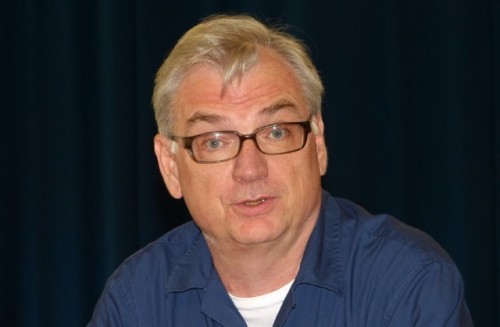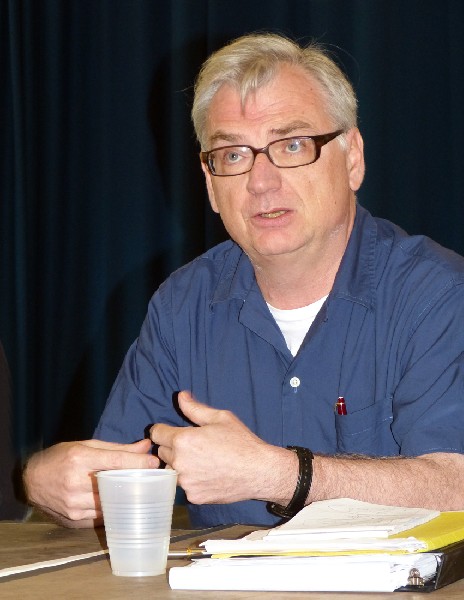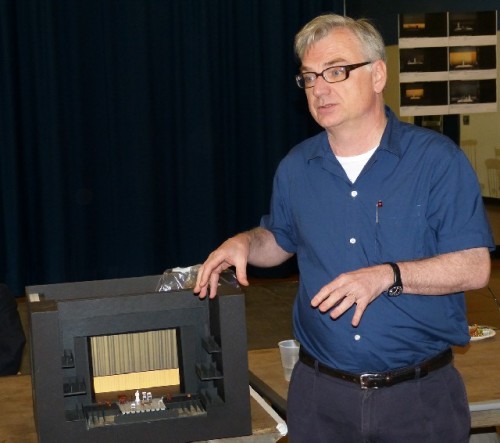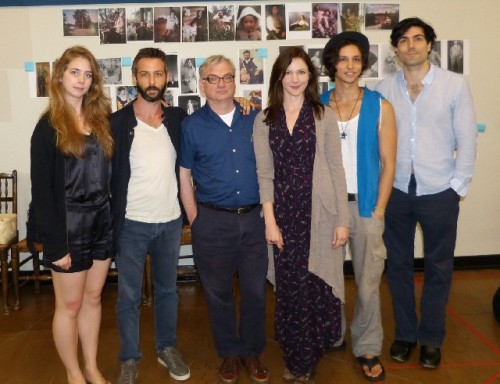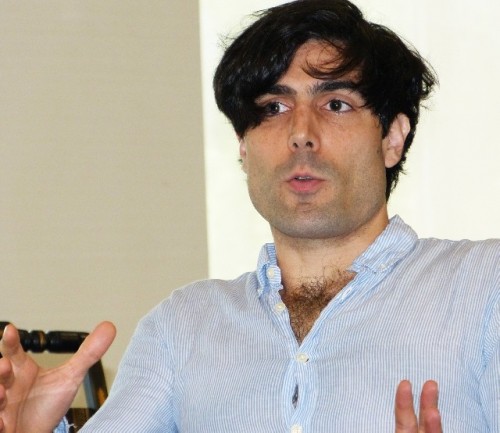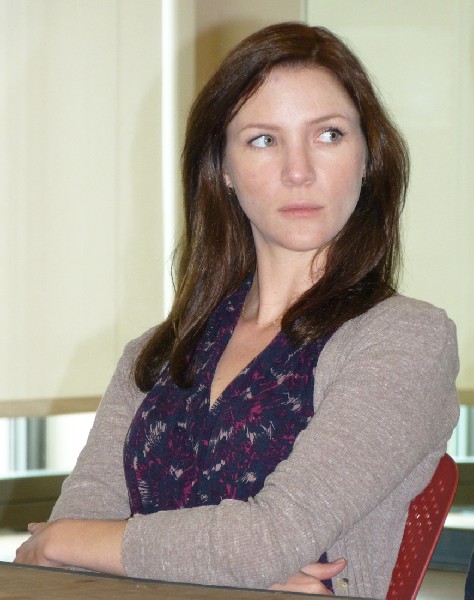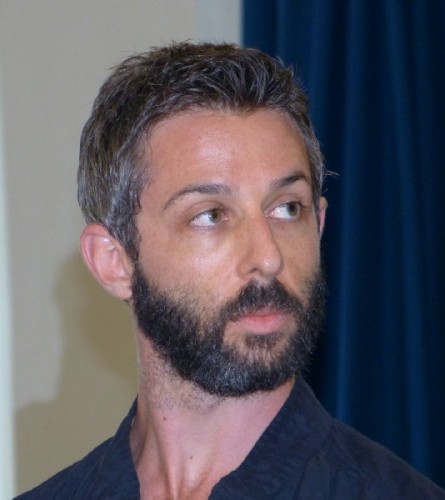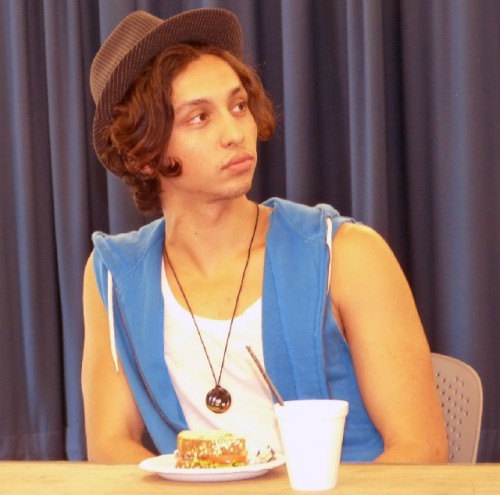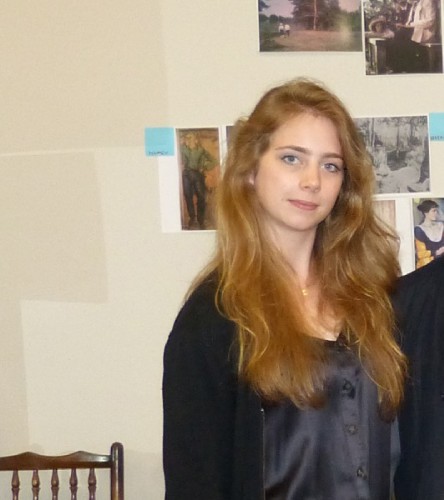Turgenev's A Month in the Country at Williamstown Theatre Festival
Radical Plans by Director/Translator Richard Nelson
By: Charles Giuliano - Jul 18, 2012
A Month in the Country, the last Main Stage production of the Willliamstown Theatre Festival season, will be presented from August 1 through August 19.
“This is an exceptional production for us on so many levels” said Jenny Gersten the artistic director of WTF. “This translation is momentous as it marks the first foray into dramatic writing by the renowned Pevears. They have chosen to collaborate with the incomparable Richard Nelson, who has been a WTF playwright and director over five decades. Their work together is a revelation, and as such, it is being produced in revelatory fashion. We are completely re-inventing the way we produce in the Main Stage for A Month in the County."
During a lunch break from rehearsals the director/ co translator, Richard Nelson and several members of the cast met with the media. It was the third such press conference this season. What follows is an edited transcript of the dialogue.
Richard Nelson Just to give you a bit of background about the translation and the play. Things we are doing differently from the norm for Williamstown in this production. Richard Pevear and Larissa Volokhonsky are the foremost translators of Russian prose. They are super stars within that field. Their Anna Karenina, which was an Oprah selection, sold 900,000 copies in America. They are the most successful recent translators of Dostoyevsky, Tolstoy, Chekhov prose, Gogol. Last year they brought out a new Doctor Zhivago. They are very significant people.
I approached them out of the blue. I didn’t know them and they didn’t know me. I said “I notice you’ve never translated plays before.” I told them that I’m a playwright and I have done translations working off of a literal translation. Line by line. And I did that because I felt the need for the understanding of a play by a playwright. I wrote to them. They understood that and completely agreed. So we agreed to collaborate.
The reason why it is different from prose is quite simple. A playwright doesn’t write words. A playwright writes people. That’s what we do. Words are an indication for actors to embody in such a way as to create people. So that’s the goal which is very different than translating prose.
We chose A Month in the Country because I felt there wasn’t a good, practical translation of this play in English today. It is a classic but I found all translations of this play rather stilted and difficult to act. Also, I felt that the play had been misunderstood over the years. Often it had been presented as a play about an older woman going through a middle age crisis who falls for a young guy. That’s how it’s often been done. The main character is often played by a woman in her fifties. When, in fact, Turgenev makes it very clear that the woman is 29. Her thirtieth birthday is one week later than this play. It’s a very different play. It’s a play about young people. All the major characters are young from 34 down to 17. I thought that would be a very exciting reason to tackle this play.
We worked at first via internet then we met for a month in their farm house in Burgundy, France. We finished it not last May but the May before.
It’s a play that’s very intimate. It’s a very psychological play with a goal to get inside the minds of a few of the characters. To almost look over their shoulder. When Jenny (Gersten) suggested that we do it here, and on the Main Stage, I thought that would require some rethinking of how the Main Stage looked.
We have two major changes from the norm at Williamstown. One, we are taking out the first four rows of the theater. We are building a platform out. Fourteen feet deep and sixteen and a half feet wide. The play will take place on that platform in the middle of the house. With the audience on the sides. So we’ve moved the stage into the house. To bring it closer and surrounded by audience.
Second. Above the stage. Eight to ten feet above will be twenty to thirty hanging microphones. There will be a person on a mixing board capable of turning microphones on and off. To mix it live.
Why do we do that? All of these extraordinary actors, they can project on that stage. So why do you need microphones? Well, if you are trying to create an intimate environment. An intimate environment you want to be able to have people talk in a way that is most natural. Like I’m talking to you right now. If I start to speak up there (elevating and projecting his voice) I become a different person. Also, I have to keep facing you because if I turn away you’re not going to hear me. If I have mikes overhead then I can turn away. You can start to feel that you are looking through a peephole, over the shoulder, and into the minds of the characters.
This play is pure psychology. How the mind works. And that’s what we are trying to put on the stage. So these are the tools and the ambitions of these tools which we’ve used.
Here’s the set which you can look at. (Shows and discusses the maquette) A few chairs and a few tables and that’s it. Second act is a bench. Only a bench. Third act going back. Fourth act, nothing. Fifth act we bring back a little furniture. Also you’ll see chairs to the sides. The company of actors who perform in the play will be on stage the whole time. There are seats along the sides which are visible just like those in the audience. They never leave so it is a very simple picture which we are trying to create.
And the curtain. When you come to the theater you will see two choices; the curtain which is already there, or the fire curtain. So you see we are trying to create not a set at all.
So, when I said this is different for Williamstown I think, in and of itself, this describes why.
It’s a difficult play to translate. It’s dense and it needs to be very clear in its density. A lot of translations convey the density and complexity but it’s very hard to follow it. So we are making it clear and not losing its complexity. Mr. Turgenevy called it a comedy but it’s a comedy in the way that Chekhov called some of his plays comedies. It’s an ironic play but you would not call it a romantic comedy. It’s about the complexities and confusions of love and passion. It’s dark.
Charles Giuliano Most of us know Russian theatre primarily through the plays of Chekhov. Could you discuss the differences between Chekhov and Turgenev?
RN This play was written in 1850 long before Chekhov was born. Many people believe, including me, that Turgenev was an influence on Chekhov. This play was forgotten for much of the 19th century. He didn’t even see it performed until 30 years after it was written. Its revival came about in 1909 in the Moscow Art Theater shortly after the Chekhov productions. So Chekhov, oddly enough, paved the way for understanding what Turgenev was doing. It also influenced Chekhov. It was Chekhov himself who urged the Moscow Art Theater to do the play. The fact that there is not much plot but a huge amount of character and psychology is what centers and holds the play together. That’s very Chekovian. When Stanislavsky directed A Month in the Country after the Chekhovs he told people this was pure psychology. Chekhov was just practice for this. He said “You know when we did the Chekhov we had crickets and trees and all this stuff. Not for this. We’re going to have a couple of chairs. We’re going to have a bench. Nothing is going to get in the way between the people and the audience.” That’s been our mantra as well.
Actor You e mailed me something that it had been a test of naturalism. A test of realism.
RN You’re right. He did say to the actors “This is what we’ve learned. This is what we are going to show. How far we needed to go.” It was the first effort for Stanislavsky to use his method in rehearsal with this play.
Larry Murray You pared away the scenery. You pared away the accoutrements on stage. The plot is not as important as the psychological dimensions. It comes down to the audience vs. the actors. The full weight of this production rests on the actors to make it a compelling story.
RN I would never say the audience vs. the actors. I would say the goal is to make them one. My hope is that by thrusting this out and having the mikes placed through the theater that we bring everybody into the same room. So that we recognize that we are all in this experience together. Actor and audience. It would be a terrific thing if we could achieve that. But you’re right. The relationship between actors and the audience is the very heart of this play.
LM The audience therefore gets into the minds of the characters. As opposed to following some plot per se. What I’m asking is how does an audience prepare?
Jeremy Strong As young actors this is new for a lot of us. We read the Peter Brook book about the theater (The Empty Space: A Book About the Theatre: Deadly, Holy, Rough, Immediate) which is essentially about stripping away the artifice of theater and restoring the primacy of the relationship between the actor and the audience, and language, and the communion of the theater in a very bare way, which is about truth and that exchange. It’s incredibly courageous of Jenny (Gersten) to be doing this play here. And for Richard to be doing it in the way that we’re doing it. It’s a radical new thing for both us and the audience. It’s a real challenge. Frightening and exhilarating.
Jessica Collins There isn’t any preparation that the audience needs to do. The hope is the audience will be affected by the intimacy and vulnerability of what’s going on. In a way that engages them.
RN It’s about expectations. If the curtain opens up and you expect one of those gorgeous WTF sets and it doesn’t happen. I want the expectations to be pulled aside. I want people just to be open to the experience. Of what we’re trying to do. That would be my goal.
CG I have a multi-valent response to what you are discussing. This production sounds very radical. You are dovetailing us back to 1850 and how it was radical then. One could reach further back and conclude isn’t this really Ancient Greek? Oedipus Rex. The use of the mask. Or Beckett. Can you sweep us through that arc of thought?
RN You’re absolutely right. If you look at the vast history of theatre you know that Shakespeare’s Globe Theater didn’t change sets. It was a space in which all these different plays; comedies, tragedies, histories, happened. The plays were written that way. As you say. The Greeks. Go thorough the history of western theatre. My designer is Japanese and he has dealt with Noh theatre and the simplicity of all that. So I have learned some things. But in the history of theatre simplicity and a direct relationship with the audience has been at the heart of so much. The decorative world of showing something, presenting something, has had its own traditions. Going back to masks for the court. The tradition we’re working from is a very healthy one. And a very long one as you say. Back to the origins of theatre. When Peter Brook went to Africa to study the origins of theatre he went to villages. There he said “What do we need?” He took a stick and he dug a line to make a space. He said “Here’s my stage. Let’s start from there.”
CG So you are both radically contemporary and also adamantly ancient.
RN And insanely conservative. (laughs)
CG That’s a lot of positions to maintain simultaneously. We’ll see how it works. Will this be lost on an audience? Will they relate to what’s happening to them?
RN I believe it will be lost on some who have expectations. For example. There are people who have rules about things. If you don’t follow those rules you’re somehow wrong. You made a mistake. If they see microphones hanging from the ceiling they think why? These aren’t real actors as they can’t project. They don’t realize you’re trying to do something else. Let me say something about microphones. I worked with a great, great British director Trevor Nunn. (Sir Trevor Robert Nunn, born 14 January 1940, is an English theatre, film and television director. Nunn has been the Artistic Director for the Royal Shakespeare Company, the Royal National Theatre, and, currently, the Theatre Royal, Haymarket) He said to me “Do you know why in the 19th century actors made these big gestures? Is it because audiences were unsubtle then and we’re subtle now? It was because of the light. Because of the gas light. Gas light has waves. If you’re going to see something on stage from the second balcony you need a broad gesture to see. The moment you had electric light you had realism on stage.” The world changed because of technology. That’s when he said to me “Why are we so hesitant to use the technology of sound in the theater?” We’re holding back as if ‘These are the old ways and we have to stand there and project and if not you’re some kind of lesser actor.’ That is what holds theatre back. That’s what limits us. Those kinds of rules. That kind of rigidity. There are people who will come to this show who have those rules and that rigidity and not understand. Hopefully some of you can help us to show what we are trying to do. Whether we succeed or not but at least what we are trying to do to those people who can and will have an open mind.
CG So part of your process is educating us. The critics. If we don’t get it than what chance does the audience have?
RN That’s why I was very happy that you could come today. And to come to our rehearsal room. This is the place where I would like to have this conversation.
Actors We’re all grappling with the challenges of being seated on the stage on the sides. So when you come on into the space there’s not much to help your imagination. When you are on the sides you have to stay very alive in some capacity. When you cross the boundary into the world you are about to play in it’s there for you. So that’s something that I’m struggling with and thinking about. We are working intimately with the people on stage but in a world that hasn’t been given to us through a set. So making it real is doubly challenging…
There’s something interesting that happens when you can’t hide behind a prop. Your connection is with those live beings who are on that space with you. In a way it’s very freeing. There’s no need to show that there is a real drive to connect. Or disconnect from who you are playing the scene with. That’s really nice…
It’s a kind of x-ray I think. You have nothing else. The connection between you. So you live or die by that really. By whether it’s authentically happening or not. If not there’s no way to hide that. To keep it truly alive vs. synthetically it’s going to be a real challenge for us to give it to you…
What it does in my experience is it really helps you indicate when something is false. Or coming from an untruthful place. I’ve derailed from what’s actually going on. That’s really interesting. It strips you away from your ideas of something. When you impose something that’s showy as an actor you can recognize quite easily what’s untruthful for the scene…
Richard is interested in real people being on stage. Real human beings being on stage. Relating to each other in a real way which I think is the scariest and hardest thing for an actor to do. Because you’re not allowed to act…
Every time you begin a process there’s a whole number of restraints you have to deal with. That depends on the play and director. Hopefully this touches on different nerves. You find different strategies to deal with things. Some strategies you might use in another context are totally useless.

